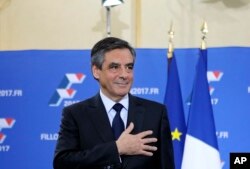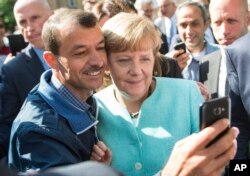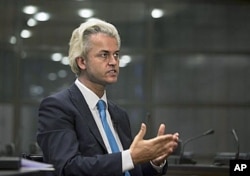Austria's elections on Sunday could see Norbert Hofer chosen as the country's first far-right leader since World War II. Austrians will head to the polls following a victory this week by Francois Fillon, the more right-leaning of two candidates in France's conservative primary.
Analysts say voters in both countries are being heavily influenced by Brexit and the election of Donald Trump in the United States.
Fillon, a former prime minister under President Nicolas Sarkozy, was the more conservative of two top candidates running for president in France's Republican Party primary elections Sunday. He has been compared to the late British conservative Prime Minister Margaret Thatcher for his calls to slash government spending, cut taxes for the wealthy, boost defense and get rid of France's 35-hour work week.
Analysts say his victory points to a clear swing to the right among French voters, a trend that was already visible in the rise of Marine Le Pen's far-right, anti-immigrant National Front, whose popularity ratings soared after a series of terrorist attacks shook France last summer.
Fillon's victory heading into the French general elections next year is also a further sign that anti-establishment sentiments are brewing in France much in the same way as they have been in the United States and elsewhere in Europe.
Another outsider
Many voters consider Fillon, a lawyer-turned-politician, an outsider like Trump and think he could bring a set of fresh ideas in the wake of an administration led by Socialist President Francois Hollande, whom newspapers have depicted in cartoons and commentaries as comatose. Hollande's approval ratings slipped to 4 percent in November.
This Sunday's presidential elections in Austria could reflect a similar trend and serve as a test for the strength of populist movements in Europe.
The Austrian poll is a rerun of elections held in May, when results showed the Freedom Party's Hofer, a former aeronautical engineer, lost by 31,000 votes to Alexander Van der Bellen, a Green Party member who ran as an independent. Austria's constitutional court overturned the results after an investigation found irregularities in the counting of mailed-in ballots.
Analysts attribute the rise of populist, right-wing movements in Europe to anger over a system that voters see as corrupt and rigged against the common person.
"You find that governments and lawmakers are losing the trust of their citizens," said Maggie Murphy, senior global advocacy manager at Transparency International. The group recently released a study that found one in three citizens polled in Europe and Central Asia considered corruption a big problem in their countries. That was the case not only in former Eastern Bloc countries and Central Asia, but in highly developed Western European democracies like Britain, France, Germany, Italy and Spain.
'Elites not listening'
"Nearly one-third of people found their governments and their lawmakers were highly corrupt — not just a little bit corrupt, but highly corrupt," she said. "People felt that the wealthy were playing a bigger role in the government decision-making than they should be." There was a link, she said, between people's frustration and what they see as "elites not listening to them."
That sentiment partly explains the rise of right-wing movements in Germany, where Chancellor Angela Merkel will seek a fourth term next year despite signs of a deteriorating base.
Merkel's Christian Democrats came in third in regional elections in her home district in September, beaten by the new Alternative for Germany party, AfD.
"It's a pretty amazing thing when you think a party only formed three years ago can end up defeating Angela Merkel's party," said Douglas Murray, a commentator and associate director of the Henry Jackson Society in London. He said the losses reflected anger among voters who feel they have been ignored or written off for complaining about things like Merkel's policy of accepting refugees in large numbers.
"People who vote for AfD will be smeared by a lot of people at the moment as far right, racists, xenophobes and so on, whereas in actual fact a more sensible thing to do, it would seem to me, would be to listen to the serious concerns that a lot of people have, wonder how it is that an only three-year-old party of any political stripe could emerge and whether or not it doesn't indeed have some legitimate concerns. I would argue that it does," he said.
Mistrust of the media is another concern, one that has been seized by anti-establishment politicians who accuse news outlets of downplaying terrorist attacks and problems related to immigration.
Cautious approach
"A lot of the media believe they have to tread very carefully, and they may not be entirely wrong. If we were to have terrorist attacks at the rate that they were going in July in Europe, you would see serious civil unrest in Europe," Murray said. But he said the age of the internet has brought other dangers.
"If a lot of the media continue to do that, they will simply push people further away from reputable mainstream media resources and into the arms of less reputable media," he said, referring to the emergence of fake news sites and portals that promote hatred and misinformation.
Many Europeans watched the U.S. elections closely, and leaders of right-wing movements in France, Germany, Italy, the Netherlands and other European nations holding elections in the coming months hope to get a boost from Trump's victory.
Among those politicians is Geert Wilders, a controversial member of the Dutch parliament known for his criticism of Islam and immigration. Wilders is awaiting a verdict after being tried on charges of inciting hatred after leading a chant at a rally calling for the Netherlands to accept fewer Moroccan immigrants.
Wilders' Freedom Party is topping the polls ahead of the Netherlands' parliamentary elections in March, and the momentum of his movement is evident. Dutch members of parliament on Tuesday voted to ban the burqa, an Islamic face covering, from public places including schools, hospitals and public transportation.
In an interview with the Russian network Russia Today, he cited Trump's election as an example for Europe.
"The lesson for Europeans is look at America. What America can do, we can do as well," Wilders said.







